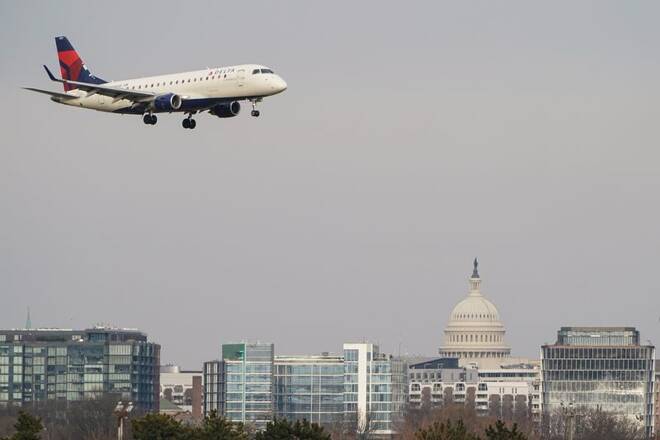Advertisement
Advertisement
Delta, United Airlines sound bullish on post-pandemic spending
By:
(Reuters) - Delta Air Lines Inc said on Wednesday it expects second-quarter adjusted revenue at pre-pandemic levels due to the easing of COVID-19 curbs and bottled-up travel demand.
By Rajesh Kumar Singh and Aishwarya Nair
(Reuters) -Delta Air Lines Inc and United Airlines on Wednesday played down the risk of a U.S. economic recession and said a switch in consumer spending to services from goods would keep their businesses humming.
Delta also lifted its revenue forecast for the quarter through June despite trimming capacity, suggesting rising air fares have not deterred travelers.
“The demand is off the charts,” Delta Chief Executive Ed Bastian told the Bernstein Conference.
A 40-year high inflation and rising interest rates have increased the possibility of the world’s biggest economy slipping into a recession, according to some economic experts.
Bastian, however, said there was no evidence to back those concerns. “Our consumer is quite healthy,” he said.
United Chief Executive Scott Kirby, who also spoke at the conference, echoed that sentiment. “The economy is just returning to normal,” Kirby said.
The surge in bookings is driven by pent-up demand as the COVID-19 pandemic limited air travel for two years. Office reopenings and easing border restrictions have also helped.
Delta is the latest American carrier to raise its revenue estimate. Last month, United, Southwest Airlines Co and JetBlue Corp Airways all upgraded their revenue outlook for the current quarter.
Strong consumer demand is also helping carriers deal with soaring fuel costs, which have more than doubled in the past year.
Delta raised its fuel bill estimate for the June quarter by up to 13%.
Fuel is the industry’s second-biggest expense after labor, but major U.S. airlines do not hedge against volatile oil prices like most European airlines.
Instead, they typically look to offset fuel costs with higher fares. Average fares are up about 50% from a year ago, according to data from Cowen equity research.
Some analysts are concerned that rising fares could dent travel spending.
But Kirby said there was “not a hint of evidence” that rising ticket prices were hurting consumer demand.
“We’re just back to normal pricing,” he said. “It feels like high pricing today because we’re comparing to an artificial low coming off the pandemic.”
(Reporting by Rajesh Kumar Singh in Chicago and Aishwarya Nair in Bengaluru; Editing by Shounak Dasgupta and Grant McCool)
About the Author
Reuterscontributor
Reuters, the news and media division of Thomson Reuters, is the world’s largest international multimedia news provider reaching more than one billion people every day. Reuters provides trusted business, financial, national, and international news to professionals via Thomson Reuters desktops, the world's media organizations, and directly to consumers at Reuters.com and via Reuters TV. Learn more about Thomson Reuters products:
Did you find this article useful?
Latest news and analysis
Advertisement
